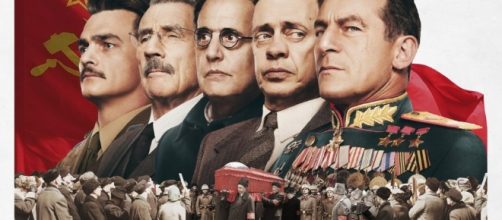Director Armando Iannucci is always able to convey that ego and misunderstanding can derail even the best political intentions, often to the point where it's a miracle that nation-states can function at all. While the comic potential of these mishaps is evident in the democracies of the United Kingdom and the USA, where Iannucci has previously focused his political satire, bringing it to the horrendous crimes of Stalinist Russia may be an entirely different challenge.
In 1953 Stalin suffers a stroke, and head of the NKVD secret police Laventry Beria (Simon Russell Beale) moves quickly to cement his position and stick the reformist Nikita Khrushchev (Steve Buscemi) with the funeral arrangements.
Soon both are courting favour from political mainstays such as Georgy Malenkov (Jeffrey Tambor) and Vyacheslav Molotov (Michael Palin) and trying to contain Stalin's drunken son Vasily (Rupert Friend).
It is a great achievement that Iannucci is able to see the comic absurdity in the atrocities of the NKVD (precursor to the KGB), and in the terrifying power wielded by a tiny cabal of ageing men.
Whilst for those of us whose A Level studies left us with a rough grasp of the events unfolding, it would take greater expertise to pick out every historical aberration in this film. It is a film that provides great fun for people with zero knowledge of Soviet history, keeping the viewer in genuine suspense as to who will succeed Stalin and how.
Ego and dogmatism
With such ego and dogmatism, the politicians of Stalin's Russia share unnerving similarities with the leaders of today.
This is an ensemble cast, with brilliant acting performances across the board. A standout is Jason Isaacs as the fêted General Zhukov. He is supremely self-confident, sharp and wickedly funny. Simon Russell Beale is known more for his stage work, yet is more than able to hold his own alongside the cinematic talent. Beria is a man of great evil, and that Beale is able to incorporate a comedy into the role is a mastery of writing and performance. This downfall of a sexual deviant could not come at a more apt time for Hollywood.
Production design is another highlight of the film.
Physical comedy and moving from room to room may entertain the eye, but the ensuring that the air of 50s Russia is consistent is also essential. The shots of the Kremlin and Red Square are suitably lavish, while the headquarters of the NKVD have the feel of a dungeon on steroids.
There are a couple of 'Thick of It' moment set-pieces that are downright hilarious. What comes to mind are Comrade Andryev (Paddy Considine) forced to immediately repeat a concert performance for Stalin's leisure, and Khrushchev trying to negotiate a coup and a state funeral at the same time.
Iannucci has reteamed with writer Ian Martin with whom he has worked on "The Thick of It" and "Veep", and "The Death Of Stalin" retains that same crudity and escalating nonsense.
David Schnieder has been brought on board, a writer with experience of Soviet-set material from his play "Making Stalin Laugh", about the massacre of the Moscow State Jewish Theatre troupe in 1952.
There is also an undercurrent of subversion not seen since Iannucci worked with Chris Morris, seen not least in the absurd dedication of soldiers and politicians in an attempt to save their own skin. While the politicians of the West have long since been knocked from their pedestal, all strands of comedy in "The Death of Stalin" carry a certain mischevious undercurrent in the knowledge that many humourless Russians will detest it.
A single point of criticism is perhaps that Beria's collapse happens a bit too suddenly.
At one moment he seems to hold all the cards, the next he's desperately unleashing his rage on close compatriots.
Just as Nolan shifted his output with Dunkirk and delivered one of his best works, Iannucci has moved timeframe and political atmosphere to create a phenomenal satire. One death is a tragedy unless it's "The Death of Stalin".
Rating: 4.5/5


